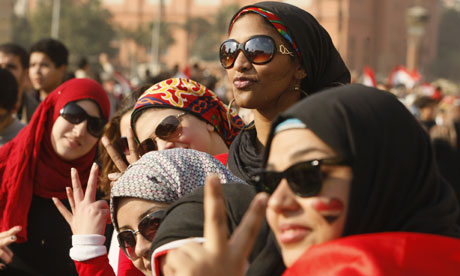Violence Against Women
Source: Daily News Egypt
The new tripartite strategy involves prevention, protection and intervention, and will include raising awareness, and the rehabilitation of those perpetrating violence as well as their victims.
The National Council for Women (NCW), in collaboration with several government ministries, launched on Monday a national strategy to combat violence against women.
In a conference attended by Prime Minister Ibrahim Mehleb, the NCW signed the strategy after reviewing a 2012 study showing the affect of violence on women.
According to the study, 38% of this violence was verbal, 29% was physical, and 33 % was family related.
"All types of violence against women are deviations from rights that are constitutionally guaranteed, as well as from ethics and religion," Mehleb said.
The new tripartite strategy involves prevention, protection and intervention, and will include raising awareness, and the rehabilitation of those perpetrating violence as well as their victims.
NCW Head Mervat Al-Tellawy said that implementing this strategy would require transparency, scientific methods, sticking to traditions and communication between all sides.
"It is our [the government's] responsibility to put [in place] a strategy to combat violence against women to achieve social and economic peace, which is what modern Egypt needs," said the prime minister.
According to a press release from the Ministry of Health, a facilitation committee will be formed to review laws and administrative decisions relevant to the strategy, as well as means of application and proposal submissions.
An executive committee will attend periodic meetings and contribute to the strategy's implementation, monitor the implementation of the plan, preparing periodic reports presented to the facilitation committee.
Although several agreements with ministries have previously been signed, Al-Tellawy said "loopholes" still need addressing.
The laws currently face shortfalls, she said, such as lack of information in education and media and no complete coordination between all concerned parties. This may have consequences such as losing criminal evidence throughout the long process. Another loophole is the scarcity of some specialisations and services such as those dealing with health and the availability of reference guides to those who provide these services.
"The [new] constitution took women into account and made them and men equal in civil, political and social rights," said Mehleb.
Mehleb said the constitution guarantees women's representation in professional councils and high managerial positions, as well as protecting them from violence. He added that the constitution contains "real and practical solutions to solve currently prevalent social phenomena amongst Egyptian youth".
 Egyptian women in Tahrir Square, February 2011. Photograph: Mohammed Abed/AFP/Getty Images
Egyptian women in Tahrir Square, February 2011. Photograph: Mohammed Abed/AFP/Getty Images
The NCW signed the protocol for this new strategy with the ministries of interior, social solidarity, youth, education, manpower and immigration, justice, endowments and health. It was signed in the presence of the ministers as well as other public figures and representatives of several NGOs and political parties.
Minister of Health Adel Awadi said the ministry allocates medical teams responsible for treatment and psychological rehabilitation of victims of violence and harassment. It also conducts research to study societal and psychological impact on the victims of violence and harassment, and to develop methods to address this negative phenomenon.
Al-Tellawy noted several achievements made by the council, including the establishment of an office and hotline for complaints in 2000. In 2009 the council conducted a study that was the base of the general strategy effected in 2010, and in 2011 the harassment law was amended, with a bill to protect women enforced in 2012, she said.
"During the rule of the Muslim Brotherhood, an international document to protect women was issued... which put Egypt in a valued position," said Al-Tellawy.
The document included various definitions of 'violence' to include poverty, illiteracy and health problems.
Al-Tellawy also mentioned several collaborations between the council and different ministries. In 2013 the Ministry of Interior signed a protocol with the council, establishing a unit specifically for combating violence, the employment of female officers, and providing statistics from a number of governorates.
The ministry of justice also signed a protocol with the NCW and started training courses on dealing with the issue.
The protocol signed with the Ministry of Health ensure the necessary council and medical units to deal with those subjected to violence.
